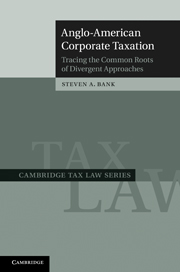2 - The United Kingdom
from Part I - Twentieth century and the divergence in systems
Published online by Cambridge University Press: 07 October 2011
Summary
Although the United Kingdom formally maintained its shareholder imputation approach through much of the twentieth century, a variety of new challenges – wars, depressions, and emerging political and economic forces – led it to try alternative methods of corporate taxation. During large swaths of the century, the UK deviated from its pure imputation system, either by adopting an additional entity-level tax as an overlay on the shareholder imputation system or by adopting an entirely new system of entity-focused taxation. In large part, the UK was motivated to adopt these fairly radical innovations during periods in which it sought to dampen the amount of dividends and increase the tendency of corporations to plow back earnings into the business.
1900–18
The major innovation in the British income tax system between 1842 and 1918 was the introduction of the principle of graduation in 1909. Graduated rates had been introduced indirectly starting in 1853 with the use of abatements, but this was found to be impractical for reaching higher incomes without completely exempting lower incomes. For most of this earlier period, all attempts to explicitly introduce progressivity beyond an exemption or abatement amount were rejected. Seligman reported that during the nineteenth century “the principle of progressive or graduated taxation . . . had been uniformly reprobated not only by all English statesmen, but by the great mass of important British thinkers.”
- Type
- Chapter
- Information
- Anglo-American Corporate TaxationTracing the Common Roots of Divergent Approaches, pp. 49 - 69Publisher: Cambridge University PressPrint publication year: 2011

